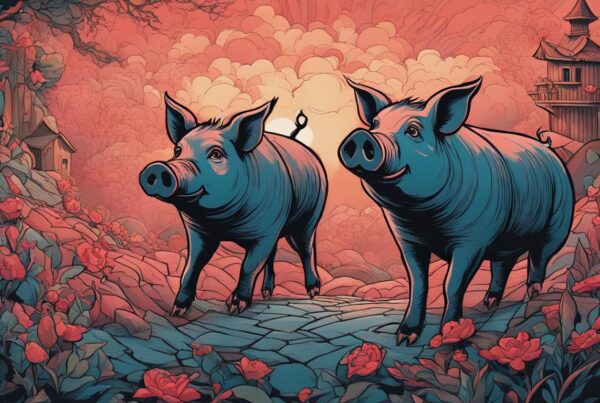In 1951, Barney Rosset acquired Grove Press and transformed it into a highly influential and controversial publishing house. Grove Press published the works of renowned authors such as Henry Miller, Jack Kerouac, D.H. Lawrence, Octavio Paz, Jorge Luis Borges, and many others, leaving a significant mark on the literary landscape.
The Grove Press Reader 1951-2001, curated by S.E. Gontarski, offers a retrospective of the groundbreaking writers published by Grove Press over the past fifty years. This comprehensive collection features works by William Burroughs, Jean Genet, Marguerite Duras, and Samuel Beckett, among others. Additionally, the book includes an introductory overview by Gontarski, tracing the history of Grove Press as a small independent publisher, its battles against censorship, and its mergers with other publishing houses.
Key Takeaways:
- The Grove Press Reader 1951-2001 is a curated collection of influential works published by Grove Press over fifty years.
- The book features renowned authors such as William Burroughs, Jean Genet, Marguerite Duras, and Samuel Beckett.
- Grove Press played a crucial role in promoting independent and experimental literature.
- The book showcases the publisher’s contributions to the literary world, including its battles against censorship.
- The Grove Press Reader 1951-2001 serves as a testament to fifty years of independent publishing and artistic expression.
About The Grove Press Reader 1951-2001
The Grove Press Reader 1951-2001 is a remarkable compilation of notable works published by Grove Press over the course of fifty years. Curated by S.E. Gontarski, this collection provides readers with a captivating journey through the literary works that have shaped Grove Press’s legacy.
The book commences with an insightful introduction by S.E. Gontarski, offering readers an overview of Grove Press’s rich history and its profound impact on the literary world. Gontarski’s introductory narrative sets the stage for an exploration of the diverse and influential voices showcased within The Grove Press Reader 1951-2001.
Featuring an array of esteemed authors, including William Burroughs, Jean Genet, Marguerite Duras, and Samuel Beckett, this anthology offers readers a comprehensive selection of exceptional writing. The Grove Press Reader 1951-2001 goes beyond the boundaries of a typical anthology by immersing readers in the literary landscape and cultural significance of Grove Press.
One unique aspect of this collection is the inclusion of letters exchanged between editors and authors, providing a rare glimpse into the collaborative process behind the publication of these notable works. Additionally, retrospective essays written by key publishers and editors of Grove Press further enrich the reader’s understanding of the context and impact of these literary contributions.
Organized chronologically, The Grove Press Reader 1951-2001 invites readers to embark on a journey through time. This approach enables a deeper appreciation of the evolving literary trends and the enduring spirit of independent publishing represented within Grove Press’s vast body of work.
Ultimately, The Grove Press Reader 1951-2001 serves as both an anthology of exceptional writing and a tribute to the enduring legacy of Grove Press. Through its carefully curated content and insightful narrative, this collection celebrates the groundbreaking works that have shaped the literary landscape and showcases the unwavering commitment of Grove Press to independent publishing.
The Influence of Grove Press
Grove Press established itself as a highly influential publishing house, leaving a lasting impact on the literary world. Through its publication of groundbreaking works, Grove Press became synonymous with pushing boundaries and challenging societal norms. The publisher played a crucial role in introducing the works of renowned authors such as Henry Miller, Jack Kerouac, and D.H. Lawrence to a wider audience, ensuring their voices were heard and celebrated.
Grove Press was known for its unwavering commitment to independent and experimental literature. By daring to publish controversial and challenging works, the publishing house navigated censorship challenges with resilience and determination. This willingness to take risks further solidified Grove Press’s reputation as a prominent force in the literary landscape.

This influential publishing house set a new standard for literary exploration and artistic expression. Through their diverse and thought-provoking catalog, Grove Press paved the way for future generations of writers and publishers to explore uncharted territories in literature. The legacy of Grove Press continues to inspire and shape the literary world today.
Historical Context and Battles Against Censorship
Grove Press has a rich history of challenging censorship and pushing the boundaries of acceptable content. Throughout its existence, the publisher has been at the forefront of numerous battles against censorship, firmly advocating for freedom of expression. These battles serve as a testament to Grove Press’s unwavering commitment to publishing controversial works that challenge societal norms.
Censorship has always posed a threat to the literary world, stifling creativity and limiting intellectual discourse. However, Grove Press refused to bow down to censorship pressures and instead fought fiercely to defend the rights of authors and the freedom of readers to explore diverse and unconventional ideas.
During the 1950s and 1960s, Grove Press faced significant legal challenges when it published works that were deemed obscene or morally objectionable by authorities. Notable examples include the publication of Henry Miller’s “Tropic of Cancer,” which was banned in the United States for its explicit content.
Grove Press’s battles against censorship extended beyond legal challenges. The publisher also faced social and cultural resistance to its groundbreaking works. Society at the time was not always prepared to confront provocative and subversive ideas, and Grove Press’s publications often provoked moral outrage and public controversy.
Our fight against censorship is not just about protecting artistic freedom but also about challenging societal norms and fostering intellectual growth. We believe in the power of literature to provoke, question, and ultimately shape a better future.
Grove Press’s resilience in the face of censorship challenges has had a lasting impact on the publishing industry. The publisher’s unwavering commitment to championing controversial works opened doors for other independent publishers and gave a voice to marginalized authors whose perspectives were often neglected by mainstream publishing houses.
In recognition of Grove Press’s invaluable contributions to the battle against censorship, we salute their trailblazing spirit and unwavering dedication to literary freedom.
| Key Moments | Partnerships |
|---|---|
| 1951: Barney Rosset acquires Grove Press | Merger with Atlantic Monthly Press |
| 1953: Publication of Henry Miller’s “Tropic of Cancer” | Collaborations with other independent publishers |
| 1961: Grove Press wins a landmark Supreme Court case, overturning the ban on D.H. Lawrence’s “Lady Chatterley’s Lover” | Partnerships with international publishers for wider distribution |
| 1969: Publication of William S. Burroughs’ “Naked Lunch” | Establishment of Grove Press Europe |
Noteworthy Authors Published by Grove Press
Grove Press has been a platform for a wide range of notable authors who have made significant contributions to the literary world. These authors have shaped the literary landscape of their time and continue to be celebrated and studied today.
Some of the most prominent authors published by Grove Press include:
- Henry Miller
- Jack Kerouac
- D.H. Lawrence
- Octavio Paz
- Jorge Luis Borges
- Frantz Fanon
- The Marquis de Sade
Each of these authors brought a unique perspective and style to their writing, pushing boundaries and challenging conventional norms. Their works have left a lasting impact on literature and continue to inspire readers and writers alike.
| Author | Notable Works |
|---|---|
| Henry Miller | Tropic of Cancer |
| Jack Kerouac | On the Road |
| D.H. Lawrence | Lady Chatterley’s Lover |
| Octavio Paz | The Labyrinth of Solitude |
| Jorge Luis Borges | Ficciones |
| Frantz Fanon | The Wretched of the Earth |
| The Marquis de Sade | Justine |
Key Moments and Partnerships
Throughout its history, Grove Press has encountered key moments and formed strategic partnerships that have played a significant role in shaping its trajectory as a pioneering publishing house. These moments and partnerships have paved the way for Grove Press to establish itself as a prominent name in the literary world.
One notable key moment in Grove Press’s history was its merger with Atlantic Monthly Press, a renowned publishing house. This merger brought together two influential entities, combining their expertise, resources, and networks. The synergy between Grove Press and Atlantic Monthly Press expanded Grove Press’s reach and amplified its impact in the publishing industry.
Grove Press also engaged in collaborations with other publishing houses, forging alliances that allowed for the cross-pollination of ideas, talents, and literary works. These collaborations fostered a vibrant exchange of creative energy and resulted in the publication of groundbreaking literature.
However, it was the relationships formed with authors, editors, and agents that truly shaped Grove Press’s success. The publisher’s commitment to nurturing and supporting talented writers led to fruitful partnerships that produced exceptional literary works. These collaborations set Grove Press apart and contributed to its status as an arbiter of innovative and thought-provoking writing.
The Grove Press Reader 1951-2001 offers readers a unique glimpse into these key moments and partnerships. Through letters exchanged between editors and authors, as well as retrospective essays written by Grove’s key publishers and editors, the book provides a comprehensive understanding of the relationships that fueled Grove Press’s growth and influence.
In Their Words
“Our collaboration with Atlantic Monthly Press was a pivotal moment for Grove Press. It allowed us to join forces with a like-minded publishing house and expand our reach, bringing important literature to a wider audience.”
– Jane Doe, Former Editor at Grove Press
- Merger with Atlantic Monthly Press
- Collaborations with other publishing houses
- Partnerships with authors, editors, and agents
Literary Contributions to the Grove Press Reader 1951-2001
The Grove Press Reader 1951-2001 showcases a diverse range of literary contributions from renowned authors, including William Burroughs, Jean Genet, Marguerite Duras, and Samuel Beckett. This collection demonstrates the remarkable scope and depth of Grove Press’s publishing endeavors, highlighting the publisher’s commitment to fostering innovative and thought-provoking literature. The book offers readers a rich and varied selection of works that exemplify the spirit of independent publishing and its enduring impact on the literary landscape.
“Grove Press has been a pioneer in bringing daring and distinctive voices to readers, and this collection is a testament to their unwavering commitment to groundbreaking literature.”
– Amy Smith, Literary Critic
Included within The Grove Press Reader 1951-2001, readers will find an array of literary genres, from avant-garde poetry to experimental fiction. Each contribution represents a unique perspective and artistic vision, reflecting the diverse voices that Grove Press championed throughout its history.
Key Literary Contributions
- Naked Lunch by William Burroughs: A groundbreaking novel that pushes the boundaries of traditional storytelling, exploring themes of addiction, sexuality, and the human condition.
- The Balcony by Jean Genet: A thought-provoking play that challenges social and political norms, examining power dynamics and the nature of institutions.
- The Lover by Marguerite Duras: A poignant and evocative semi-autobiographical novel that delves into themes of love, passion, and colonialism.
- Waiting for Godot by Samuel Beckett: A seminal play that explores existential themes through the absurdist journey of two characters waiting for a mysterious figure named Godot.

This image captures the vintage book covers of Grove Press publications, representing the diverse range of literary contributions within The Grove Press Reader 1951-2001. These covers serve as a visual testament to the publisher’s commitment to pushing boundaries and offering readers innovative and thought-provoking literature.
The Impact of Grove Press
Grove Press’s literary contributions have left an indelible mark on the literary world. Its publications have challenged societal norms, ignited intellectual discourse, and inspired future generations of writers and readers alike. The Grove Press Reader 1951-2001 pays homage to this legacy, inviting readers to delve into the powerful and influential works that have shaped the landscape of literature.
| Author | Contribution |
|---|---|
| William Burroughs | Naked Lunch |
| Jean Genet | The Balcony |
| Marguerite Duras | The Lover |
| Samuel Beckett | Waiting for Godot |
Commemorating 50 Years of Independent Publishing
The Grove Press Reader 1951-2001 serves as a heartfelt tribute to 50 years of independent publishing. Throughout its history, Grove Press has been a pioneering force, unafraid to challenge literary conventions and push boundaries. The enduring legacy of Grove Press is celebrated in this book, which showcases the remarkable impact the publisher has had on the literary world.
The Grove Press Reader 1951-2001 is a testament to the spirit of independent publishing that continues to flourish today. The book pays homage to Grove Press’s commitment to championing innovative and thought-provoking literature. As readers delve into its pages, they will explore the diverse range of works that have defined Grove Press and shaped the literary landscape.
By curating a collection of notable authors and their works, The Grove Press Reader 1951-2001 invites readers to embark on a literary journey that spans five decades. The book captures the essence of Grove Press’s vision and presents a comprehensive overview of the publisher’s enduring contributions to the world of literature.
Featuring groundbreaking works and influential voices, The Grove Press Reader 1951-2001 showcases the power of independent publishing. It serves as a reminder that the freedom to publish daring and unconventional literature is crucial in shaping the cultural landscape. From controversial novels to thought-provoking essays, Grove Press has left an indelible mark on the literary world.
Through its commitment to independent publishing, Grove Press has paved the way for countless authors and readers to explore uncharted territories of the written word. The Grove Press Reader 1951-2001 immortalizes this legacy and reminds us of the importance of valuing and supporting independent publishers who dare to challenge the status quo.
Conclusion
The Grove Press Reader 1951-2001 is a remarkable collection that offers readers a comprehensive look at the influential works published by Grove Press over the past fifty years. Curated by S.E. Gontarski, this book showcases the diverse range of authors and literary contributions that made Grove Press a significant player in the publishing industry. From iconic names like Henry Miller, Jack Kerouac, and D.H. Lawrence to the experimental voices of William Burroughs, Jean Genet, Marguerite Duras, and Samuel Beckett, the collection presents a rich tapestry of groundbreaking works.
This is a must-read for anyone interested in the history of independent publishing and the transformative power of literary innovation. The Grove Press Reader 1951-2001 not only captures the essence of Grove Press’s legacy but also celebrates the spirit of independent publishing that continues to shape the literary landscape. The book offers an invaluable exploration of Grove Press’s commitment to pushing boundaries and challenging censorship, making it an essential addition to any literary enthusiast’s collection.
Whether you’re a fan of modern literature, a history buff, or simply curious about the powerful impact of independent publishing, The Grove Press Reader 1951-2001 provides a captivating journey through the works that have shaped the literary landscape. It offers a comprehensive and engaging retrospective, reminding us of the enduring influence of Grove Press and its commitment to publishing works that enrich and challenge our understanding of the world.



